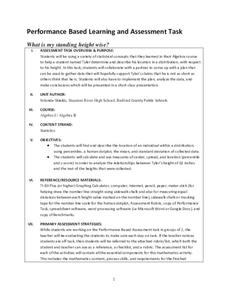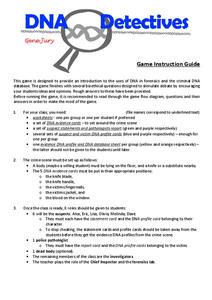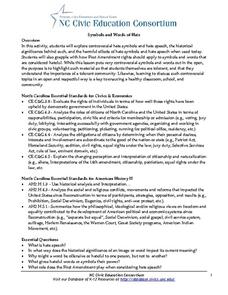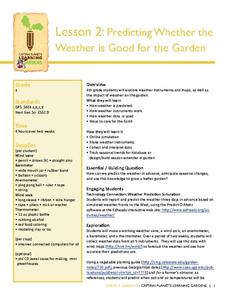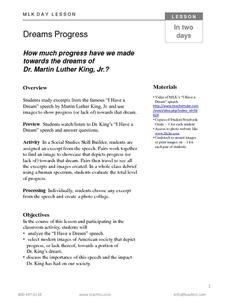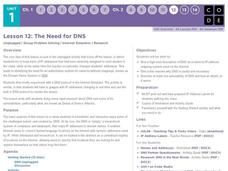Curated OER
Understanding the 1855 Census Database
Use data from the 1855 New York census to better understand the Irish immigrant experience during the late 19th century. Young historians analyze information from the census and build three hypotheses regarding the residents of the Five...
Curated OER
National Marine Sanctuaries Fish
Information is provided on Gray's Reef, Florida Keys, and Flower Garden Banks marine sanctuaries. Young marine biologists then visit the FishBase and REEF databases to collect fish species information for each location. They then...
Omaha Zoo
Monitoring Amphibians
What sort of shoes do frogs wear? Open toad sandals. If your scholars want experience collecting field samples, this is the lesson for you. After learning the proper way to collect field samples, pupils catch amphibians to test for...
American Library Association
Creating 21st Century Superheroes
Create 21st century learners by utilizing technology and library databases. Scholars explore the concept of comic books as literature and create a superhero who could uniquely solve a 21st century global issue. Databases such as SIRS are...
Curated OER
The Customers
Exploring functions not represented by an expression is this task's secret. As your learners organize business customers in a database, they explore the definition of what it is to be a function.
University of Chicago
Don't Be Too Flaky
Snow, ice, and water are all composed of H2O. Does that mean they all have the same volume? Discover the ways that the densities of these substances determine their volumes, and how they change based on their current states of...
The New York Times
Teaching the Vietnam War with Primary Sources from the New York Times
Use the New York Times database of primary sources to teach a unit on the Vietnam War. The resource consists of a variety of primary sources as well as a lesson plan showcasing how to teach a lesson using them. Pupils analyze the...
Radford University
What is My Standing Height Wise?
Given a scenario in which a class member wants to prove his height is not an outlier, pairs devise a plan and gather evidence to help support his claim. The small groups implement their plans and create graphical displays of their data...
Curated OER
InfoWeb - Computers as Accessing Tools: Distant Databases
Fourth graders complete searches on the computer to find certain pieces of information regarding North Carolina's state parks, amusement parks, and other places of interest. Pairs of students work together to create a list of things they...
Gene Jury
DNA Detectives
Police find a man murdered in a local hotel, DNA everywhere, and now they need scholars' help. Budding detectives step into a crime scene playing the roles of victim, suspects, and investigators. They apply knowledge of criminology and...
University of North Carolina
Symbols and Words of Hate
This resource is structured with exercises that ask class members to explore hate symbols and hate speech. Learners examine the historical significance and harmful effects of these words and symbols, examine the First Amendment and...
Mathematics Vision Project
Module 4: Linear and Exponential Functions
Sequences and series are traditionally thought of as topics for the pre-calculus or calculus class, when learners are figuring out how to develop limits. But this unit uses patterns and slopes of linear functions in unique ways...
Historic New Orleans Collection
Exploring Primary Sources: Music in New Orleans
Looking for a new and exciting way to teach young historians the art of primary source analysis? Jazz up your lesson plan with a resource that asks class members to analyze photos, travel documents, and letters written by some of New...
Captain Planet Foundation
Which Plant Is Which?
Learn about dichotomous keys, plant identification, and how to care for the planet with a lesson plan that includes several hands-on and innovative activities. Kids go on a plant scavenger hunt and classify the plants that they find...
Captain Planet Foundation
Predicting Whether the Weather is Good for the Garden
Can your class predict the weather? Show them how they can come close with a instructional activity about creating weather instruments, including weather vanes, barometers, wind socks, anemometers, and thermometers. Kids research weather...
TCI
Dreams Progress
Has society progressed to the dream Martin Luther King Jr. expressed in his famous address during the civil rights movement? Learners work with a partner to analyze one excerpt from King's "I Have A Dream" speech and find a current...
Code.org
The Need for DNS
That's one complicated address book! To understand the need for a system that keeps track of addresses, pupils trying to find the IP address of their classmates. Then individuals change their IP addresses, which leads to research...
National Wildlife Federation
Citizen Science to the Rescue!
You don't have to be a scientist or even out of high school to contribute to scientific research. In the 12th lesson plan in the series of 21, scholars use this opportunity to add to the growing body of scientific knowledge and consider...
Cornell University
Forensic Science: Case of the Missing Diamond Maker
Someone stole a diamond-making machine. Who done it? Scholars use forensic science at six different stations to determine the culprit. They analyze fingerprints, use their senses, and complete chemistry experiments to determine the...
Council for Economic Education
FRED and the Federal Budget Interactive Lesson
How can a federal debt accumulate over time? The Federal Reserve Economic Data (FRED) dashboard allows scholars to actively research each aspect of the federal budget. In pairs, they analyze economic data to determine the best way to...
Alabama Department of Archives and History
A Worse Death: War or Flu?
In a lesson that integrates history and mathematics, class members create graphs that compare military death statistics from World War I with those that resulted from the influenza pandemic of 1918.
Virginia Department of Education
Logarithmic Modeling
Explore logarithms and logarithmic regression. Young mathematicians first learn about inverse functions and about the logarithm function family. They take their newfound knowledge to use logarithmic functions to model situations and...
Virginia Department of Education
Exponential Modeling
Investigate exponential growth and decay. A set of six activities has pupils collecting and researching data in a variety of situations involving exponential relationships. They model these situations with exponential functions and solve...
PBS
1000 Words
A picture really can speak a thousand words—no matter how old! Scholars become history detectives as they learn how to analyze historical photos and evidence to uncover the past. The fun hands-on activity makes history come alive through...
Other popular searches
- Create a Database
- Database Programs
- Database Search
- Databases. Search Engines
- Database Research
- Access Databases
- Class Database
- Student Book Database
- Relational Database
- Database Computer Programs
- Database Lesson Plans
- Book Database







